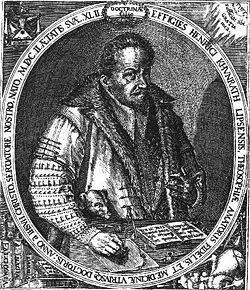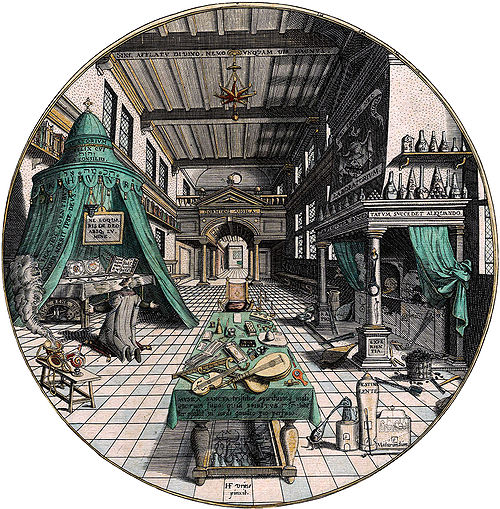
Heinrich Khunrath
Encyclopedia

Physician
A physician is a health care provider who practices the profession of medicine, which is concerned with promoting, maintaining or restoring human health through the study, diagnosis, and treatment of disease, injury and other physical and mental impairments...
, hermetic philosopher, and alchemist
Alchemy
Alchemy is an influential philosophical tradition whose early practitioners’ claims to profound powers were known from antiquity. The defining objectives of alchemy are varied; these include the creation of the fabled philosopher's stone possessing powers including the capability of turning base...
. Frances Yates
Frances Yates
Dame Frances Amelia Yates DBE was a British historian. She taught at the Warburg Institute of the University of London for many years.She wrote extensively on the occult or Neoplatonic philosophies of the Renaissance...
considered him to be a link between the philosophy of John Dee
John Dee (mathematician)
John Dee was an English mathematician, astronomer, astrologer, occultist, navigator, imperialist and consultant to Queen Elizabeth I. He devoted much of his life to the study of alchemy, divination and Hermetic philosophy....
and Rosicrucianism.
Life and education
Khunrath was born in Dresden, GermanyGermany
Germany , officially the Federal Republic of Germany , is a federal parliamentary republic in Europe. The country consists of 16 states while the capital and largest city is Berlin. Germany covers an area of 357,021 km2 and has a largely temperate seasonal climate...
, the son of the merchant Sebastian Kunrat and his wife Anna in the year 1560. He was the younger brother of the Leipzig physician Conrad Khunrath. In the winter of 1570, he may have enrolled at the University of Leipzig
University of Leipzig
The University of Leipzig , located in Leipzig in the Free State of Saxony, Germany, is one of the oldest universities in the world and the second-oldest university in Germany...
under the name of Henricus Conrad Lips. The uncertainties surrounding his life stem from his supposed use of multiple names. It is certain that in May 1588, he matriculated at the University of Basel
University of Basel
The University of Basel is located in Basel, Switzerland, and is considered to be one of leading universities in the country...
, Switzerland
Switzerland
Switzerland name of one of the Swiss cantons. ; ; ; or ), in its full name the Swiss Confederation , is a federal republic consisting of 26 cantons, with Bern as the seat of the federal authorities. The country is situated in Western Europe,Or Central Europe depending on the definition....
, earning his Medicinæ Doctor
Doctor of Medicine
Doctor of Medicine is a doctoral degree for physicians. The degree is granted by medical schools...
degree on September 3, 1588, after a defense of twenty-eight doctoral theses.
Career
Khunrath, a disciple of ParacelsusParacelsus
Paracelsus was a German-Swiss Renaissance physician, botanist, alchemist, astrologer, and general occultist....
, practiced medicine in Dresden, Magdeburg
Magdeburg
Magdeburg , is the largest city and the capital city of the Bundesland of Saxony-Anhalt, Germany. Magdeburg is situated on the Elbe River and was one of the most important medieval cities of Europe....
, and Hamburg
Hamburg
-History:The first historic name for the city was, according to Claudius Ptolemy's reports, Treva.But the city takes its modern name, Hamburg, from the first permanent building on the site, a castle whose construction was ordered by the Emperor Charlemagne in AD 808...
and may have held a professor
Professor
A professor is a scholarly teacher; the precise meaning of the term varies by country. Literally, professor derives from Latin as a "person who professes" being usually an expert in arts or sciences; a teacher of high rank...
ial position in Leipzig. He traveled widely after 1588, including a stay at the Imperial
Holy Roman Empire
The Holy Roman Empire was a realm that existed from 962 to 1806 in Central Europe.It was ruled by the Holy Roman Emperor. Its character changed during the Middle Ages and the Early Modern period, when the power of the emperor gradually weakened in favour of the princes...
court in Prague
Prague
Prague is the capital and largest city of the Czech Republic. Situated in the north-west of the country on the Vltava river, the city is home to about 1.3 million people, while its metropolitan area is estimated to have a population of over 2.3 million...
, home to the mystically inclined Habsburg
Habsburg
The House of Habsburg , also found as Hapsburg, and also known as House of Austria is one of the most important royal houses of Europe and is best known for being an origin of all of the formally elected Holy Roman Emperors between 1438 and 1740, as well as rulers of the Austrian Empire and...
emperor Rudolf II. During this court stay Khunrath met noted magician John Dee
John Dee (mathematician)
John Dee was an English mathematician, astronomer, astrologer, occultist, navigator, imperialist and consultant to Queen Elizabeth I. He devoted much of his life to the study of alchemy, divination and Hermetic philosophy....
in 1589 while the latter was confined in prison. Dee probably became Khunrath's mentor in hermetic philosophy and he praised Dee in many of his later works. In September 1591, Khunrath was appointed court physician to Count Rosemberk in Trebona. He probably met Johann Thölde while at Trebona, one of the suggested authors of the "Basilius Valentinus
Basilius Valentinus
Basil Valentine is the Anglicised version of the name Basilius Valentinus, who was allegedly a 15th-century alchemist. There are claims that he was the Canon of the Benedictine Priory of Sankt Peter in Erfurt, Germany but according to John Maxson Stillman, who wrote on the history of chemistry,...
" treatises on alchemy.
Hermetic alchemist

Magic (paranormal)
Magic is the claimed art of manipulating aspects of reality either by supernatural means or through knowledge of occult laws unknown to science. It is in contrast to science, in that science does not accept anything not subject to either direct or indirect observation, and subject to logical...
, seeking to find the secret prima materia that would lead man into eternal wisdom. The Christianized view that Khunrath took was framed around his commitment to Lutheran theology. He also held that experience and observation were essential to practical alchemical research, as would a natural philosopher.
His most famous work on alchemy is the Amphitheatrum Sapientiae Aeternae (Amphitheater of Eternal Wisdom), a work on the mystical aspects of that art , which contains the oft-seen engraving entitled "The First Stage of the Great Work," better-known as the "Alchemist's Laboratory." The book was first published at Hamburg in 1595,with four circular elaborate, hand-colored, engraved plates heightened with gold and silver which Khunrath designed and were engraved by Paullus van der Doort. The book was then made more widely available in an expanded edition with the addition of other plates published posthumously in Hanau in 1609. Amphitheatrum Sapientiae Aeternae is an alchemical classic, combining both Christianity and magic. In it, Khunrath showed himself to be an adept of spiritual alchemy and illustrated the many-staged and intricate path to spiritual perfection. Khunrath's work was important in Lutheran circles. John Warwick Montgomery
John Warwick Montgomery
John Warwick Montgomery is a noted lawyer, professor, Lutheran theologian, and prolific author living in France. He was born October 18, 1931, in Warsaw, New York, United States. In 2007 he was named "Distinguished Research Professor of Philosophy and Christian Thought" at Patrick Henry College...
has pointed out that Johann Arndt
Johann Arndt
Johann Arndt was a German Lutheran theologian who wrote several influential books of devotional Christianity...
(1555–1621), who was the influential writer of Lutheran books of pietiesm and devotion, composed a commentary on Amphitheatrum. Some of the ideas in his works are Kabbalistic
Kabbalah
Kabbalah/Kabala is a discipline and school of thought concerned with the esoteric aspect of Rabbinic Judaism. It was systematized in 11th-13th century Hachmei Provence and Spain, and again after the Expulsion from Spain, in 16th century Ottoman Palestine...
in nature and foreshadow Rosicrucianism.
Death
Khunrath may have encountered some opposition to his alchemical work because most of his publications on alchemy were published widely after his death. He died in poverty in either Dresden or Leipzig on September 9, 1605. The tension between spirituality and experiment in Amphitheatrum Sapientiae Aeternae brought about its condemnation by the Sorbonne in 1625.Writings
-
- - Reprint of the first (Hamburg 1595) and second (last) edition (Hanau 1609), together with a transcription of a German translation (18th century).
External links
- University of Wisconsin-Madison site on Khunrath's Amphitheatrum sapientiae aeternae including biography and bibliography.
- The naturall Chymicall Symboll or short Confession of Doctor Kunwrath
- Khunrath Portrait
- Heinrich Khunrath at the Galileo Project
- A Philosophicall short songe of the incorporating of the Spirit of the Lord in Salt
- "An Interpretation of the Alchemy Lab Drawing" by John Read
Books
- John Warwick MontgomeryJohn Warwick MontgomeryJohn Warwick Montgomery is a noted lawyer, professor, Lutheran theologian, and prolific author living in France. He was born October 18, 1931, in Warsaw, New York, United States. In 2007 he was named "Distinguished Research Professor of Philosophy and Christian Thought" at Patrick Henry College...
, "Lutheran Astrology and Lutheran Alchemy in the Age of the Reformation," Ambix: The Journal of the Society for the Study of Alchemy and Early Chemistry, 11 (June 1963), pp. 65–86. - Forshaw, Peter (2006). 'Curious Knowledge and Wonder-working Wisdom in the Occult Works of Heinrich Khunrath’, in R. J. W. Evans and Alexander Marr (eds), Curiosity and Wonder from the Renaissance to the Enlightenment. Ashgate.
- Peter Forshaw (2006) ‘Alchemy in the Amphitheatre’: Some consideration of the alchemical content of the engravings in Heinrich Khunrath’s Amphitheatre of Eternal Wisdom (1609), in Jacob Wamberg (ed.), Art and Alchemy. Museum Tusculanum Press
- Peter Forshaw (2007) 'Subliming Spirits: Physical-Chemistry and Theo-Alchemy in the Works of Heinrich Khunrath (1560–1605), in Stanton J. Linden (ed.), "Mystical Metal of Gold": Essays on Alchemy and Renaissance Culture. AMS Press

